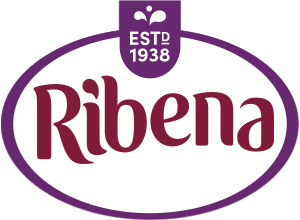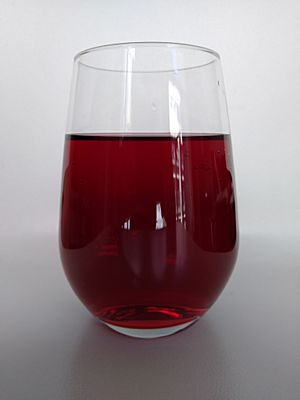Ribena facts for kids

Logo used since 2020
|
|
| Type | Soft drink/fruit juice concentrate |
|---|---|
| Manufacturer | Suntory |
| Distributor | Suntory |
| Country of origin | England |
| Region of origin | Bristol |
| Introduced | 1938 (H.W. Carter & Co) |
| Colour | Purple |
| Flavour | Blackcurrant Strawberry Blueberry Orange |
Ribena is a popular British drink. It is made from blackcurrants. You can find it as a soft drink or as a concentrate that you mix with water. Ribena comes in bottles, cans, and multi-packs. It started in England. For many years, it was made by a company called GlaxoSmithKline (GSK). In 2013, a Japanese company named Suntory bought the brand.
Ribena was once known as a very healthy drink for kids. This was because the British government gave it to children during World War II. It was a way to give them extra vitamin C. Over time, the company Beecham (which later became part of GSK) bought Ribena in 1955. They made many different versions of the drink.
Later, some questions came up about how healthy Ribena really was. People wondered about its vitamin C levels, sugar content, and how much real fruit was in some drinks. This changed its image. By 2013, most people saw Ribena as a regular soft drink. In 2013, Ribena was sold to Suntory for a lot of money. In 2018, Ribena's recipe in the UK changed. Artificial sweeteners were added because of a new tax on sugary drinks.
Contents
History of Ribena
How Ribena Started
Ribena was first made in Bristol, England. It was created by a company called HW Carter. It began as a blackcurrant squash. Scientists at the Long Ashton Research Station helped develop it. They found that blackcurrants had a lot of vitamin C.
The drink was named Ribena in 1938. The name comes from Ribes nigrum, which is the scientific name for blackcurrant.
Ribena During World War II
During the Second World War, it was hard to get fruits like oranges in the United Kingdom. This was because German submarines attacked cargo ships. So, the government encouraged people to grow more blackcurrants. The amount of blackcurrants grown in the country grew a lot.
In December 1941, the government started a special program. They gave blackcurrant syrup and cod liver oil for free to young children. This helped make sure children got enough vitamins.
Ribena After the War
After the war, Ribena production moved to a new factory in Coleford in 1947.
The company HW Carter was bought by the Beecham Group in 1955. Over the years, Beecham merged with other companies. Eventually, it became part of GlaxoSmithKline (GSK) in 2000.
GSK and the companies before it made many different types of Ribena. But the drink kept its image as a "healthy food" in the UK and other countries.
Questions About Ribena's Health Claims
In 2001, a version of Ribena called Ribena Toothkind was advertised as being better for teeth. However, the UK's advertising watchdog said these claims were misleading. The company had to remove them from the packaging. In 2003, some groups worried that the sugar in regular Ribena might lead to childhood obesity.
In 2004, two students in New Zealand did a science project. They tested the vitamin C in their favorite fruit drinks. They found that a "Ready to Drink Ribena" product had almost no vitamin C. This was surprising because Ribena was known for having lots of vitamin C. After more tests, the company, GSK, had to admit that its advertising was misleading in New Zealand. They had to change their ads and put a statement on their website. GSK said this problem only affected products sold in Australia and New Zealand. They stated that Ribena in other places, like the UK, had the vitamin C levels shown on the label.
In 2007, a study in Australia found that some Ribena fruit drinks had only 5% blackcurrant juice from concentrate.
By 2013, Ribena was selling very well around the world. In April 2013, GSK decided to sell Ribena and another drink called Lucozade. They wanted to focus more on their medicine business. The Japanese company Suntory bought both brands for a large sum of money in September 2013.
A fizzy version of Ribena came out in 2011 but was stopped in 2014. It came back to stores in 2020 with blackcurrant and raspberry flavors. This happened because fizzy flavored drinks were becoming more popular.
In 2022, Ribena teamed up with Hasbro to create a special Ribena-themed Monopoly game. About 10,000 customers won this game in an online contest.
See also
External links
 | Delilah Pierce |
 | Gordon Parks |
 | Augusta Savage |
 | Charles Ethan Porter |


